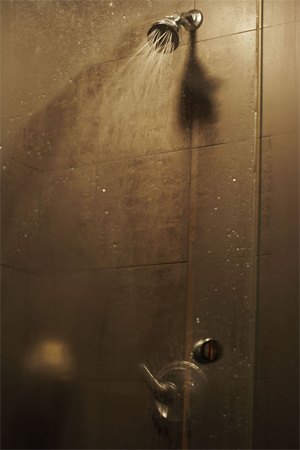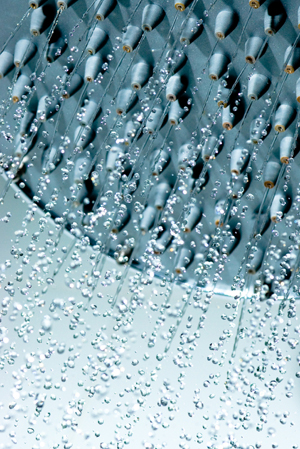Workbook Login/Register
Save your favorite products & rooms! 's Workbook
Log Out
Save your favorite products & rooms! 's Workbook
Log Out
Plumbing - Showers and Shower Doors
The reason we have shower doors is to keep water inside. This can be accomplished with a shower door or a curtain. Shower curtains are less expensive that shower doors, can be changed often and can help compliment the décor of a bathroom. However, showers let in more light, are more sanitary, are acceptable for steam shower applications, hold water in better and generally do not need to be replaced. Shower doors are a good investment because they will bring a return when the house is sold.
Considerations:

-
Showers
- The minimum size of the interior of a shower is 36” x 36”.
- Shower doors
- Before ordering, the surface material of the shower needs to be determined because materials like ceramic tile and natural stone can crack if not installed properly.
- The manufacturer and model number is needed for acrylic units before ordering a shower door.
- Before the shower can be measured for a door, the enclosure needs to be complete. The measurements need to be within 1/16 of an inch and since all walls are not straight you might want to seek a professional
Options
Shower Walls can be made from the following materials:
- Tile or Natural Stone
- Acrylic or Fiberglass Units
- Solid Surface
- Cultured Marble
Shower Pans can be made from the following materials:
- Tile or Natural Stone
- If the tiles on the wall are larger than 4x4 they may not be able to be used on the shower floor. The shower floor has to have a pitch in order for the water to drain. The size of the shower depends on the size tile that can be used. Complimentary mosaics are usually available for the shower floor tile if a small enough size is not available in the wall tile.
- Tile with textures on the shower floor are more difficult to clean, but will help with slip resistance.
- Acrylic or Fiberglass Units usually come with the shower pan made from the same material.
- Solid Surface
- Solid surface shower pans are made of the same material as the walls but are textured for slip resistance.
- Cultured Marble
- As with showers made from solid surface materials, cultured marble can be used for the shower walls as well as the shower pan.
Steam Showers

- The benefits of steam showers are increased blood circulation, metabolism, stress relief, sinus relief and relief from aching muscles.
- Steam showers can be installed in either pre-fabricated shower enclosures or custom showers.
- Newer steam units are incorporating aromatherapy into their generators.
- The steam generator is located in a concealed location outside the shower. Inside the shower are the controls which are offered in a variety of finish options.
- There is virtually no maintenance to steam showers.
- Application
- Shower doors can be applied to showers and tub enclosures.
- Types of shower doors
- Pivot/Hinged/Swinging doors
- Swinging doors can measure up to 48” in width for one panel. If the door opening is wider than 48” fixed panels are used to fill in the remaining space.
- Because these doors can be so wide, care must be given to insure the door clears items in the bathroom like the toilet, sink or bathtub.
- These doors can be mounted with a hinge or pivoting action and are secured with magnetic catches.
- Doors can be hinged where they only open one direction (single action) or both ways (double action). Single action doors are required to open outwards to eliminate the possibility of someone getting trapped inside the shower.
- Pivot/Hinged/Swinging doors
- Bypass/Sliding doors
- These doors are the most common type of shower door and require the least amount of space.
- These doors slide in a track at the top and the bottom. Most of the problems with these doors occur with the track.
- Sliding doors are sometimes mounted over bathtubs because of the length of the opening. A space at least twice the width of one door opening is required.
- One disadvantage of these type doors is limited access to the tub. If you like to sit on the side of the tub to bathe a child or pet or to wait for the tub to fill, this might not be the best choice for you.
- These doors are also helpful because the hardware used to open the doors can also serve as a towel bar.
- Bi-Fold doors
- Bi-fold doors are a combination of bypass and swinging doors.
- The advantage to these doors is they are more suitable for narrow openings.
- For smaller spaces, bi-fold doors open like an accordion and do a good job of keeping water inside the shower.
- The disadvantage of these doors is the track, usually on the bottom, for the same reasons as bypass and sliding doors. Sometimes the twisting of the doors prevents the door from operating properly.
- Round/Curved
- Rounded or curved doors are good for corner shower installations.
- Curved glass doors are panels attached to a frame at the top and the bottom for stability and smooth operation.
- Curved doors are available in left or right access.
- ADA shower doors do not have a bottom track and provide a barrier free access. In some cases, a shower curtain may be a better option.
- Not all showers require shower doors. A shower stall without a door should be at least 5-feet by 8-feet to provide enough room for adding a slope to the floor to move the water toward a drain.
- Glass Type
- Because frameless doors do not have metal framework to support them, the glass is typically thicker in frameless doors than framed doors. The glass on frameless doors is typically 3/8” to ½” thick where the glass on a framed door is typically 3/16” to ¼” thick. Even though frameless doors do not have supportive frames, they are not any less safe than framed doors.
- Steam Showers
- For showers that have steam units, the doors must have a transom above the door to completely enclose the shower so the steam does not escape.
- The optimum ceiling height for a steam shower is 7’.
- Since more time is spent in a shower with steam and it promotes relaxation, a seat is a smart option!
- The placement of the steam nozzle needs to be in a place that is safe from burning the user.
- The shower ceiling of a steam shower needs to be sloped away from the seating area so that the user will not get dripped on!

Ventilation
- When you turn on the shower, turn on the exhaust fan. Simple rule to live by! With today’s performance showers with multiple shower heads, body sprays and steam units there’s more moisture than ever in the bathroom. The steam from a whirlpool bath even needs the help of an exhaust fan. Vaporized water that hits any cold surface can cause damage.
- The recommended size of the exhaust fan depends on the size of the room and the number of fixtures in the room such as the toilet, shower and bath tub.
- Enclosed toilet rooms without a window are required to have a ventilation fan.
- Fans can be installed in the ceiling or mounted in the wall.
- The exhaust fan should be left on for 20 minutes after use of the bathroom.
- If you can’t remember to be consistent about turning on the bathroom fan, there are fans available that are activated by motion.
Shower Doors
- Frameless vs. Frameless
- Doors can come with or without a frame. The advantage to framed doors is the cost. The disadvantage is that if there is a color/finish change in the bath, the frame limits you to the old color/finish.
- On frameless doors, the handles and hinges are mounted directly to the glass. On framed doors, the hardware is attached to the frame.
- Frameless shower doors make a room feel larger.
- When frameless doors have fixed panels, those panels can be framed.
- Frames are made from anodized, extruded aluminum. This makes them resistant to rust, but porous enough to accept color for coating.
- Framed doors are offered in a large variety of colors and finish options.
- Shower door glass comes in clear, opaque and patterned.
- Patterned examples are fluted, beveled and etched. Etched doors can have images etched into the door.
Maintenance:
- Tile or Natural Stone
- Sealing the grout in the shower is the best way to avoid grout maintenance.
- Mild, neutral ph cleaners should be used to clean the shower walls and floors. Vinegar and other harsh cleaners will only damage the tile, stone or grout.
- Acrylic or Fiberglass Units
- Wipe the unit with a soft sponge or cloth after each use.
- Only mild soaps should be used. No harsh chemicals or abrasives.
- Solid Surface
- Wipe the unit with a soft sponge or cloth after each use.
- Solid surface shower walls are easy to maintain while the shower pans require a little more effort because of the texture.
- Cultured Marble
- Wipe the unit with a soft sponge or cloth after each use.
- Avoid using abrasive cleaners or steel wool because they will scratch the surface making it difficult to keep clean.
- Shower doors
- Bypass/Sliding and bi-fold doors require a little more maintenance because of the track. The track can trap dirt and be difficult to clean. Bypass and sliding doors are a little more difficult to clean because they overlap. The rollers in inexpensive units can wear and need to be replaced over time.
- Frameless shower doors are easier to clean and maintain than framed doors.
- The frame on shower doors can fade with the use of harsh cleaners and chemicals.
- Wiping or spraying the glass in a shower door after each use can help prevent hard water spots and mineral deposits.
- Clear glass is the most difficult shower door glass to maintain. It is the most rewarding when it is perfectly clean, but it also shows more, faster.

